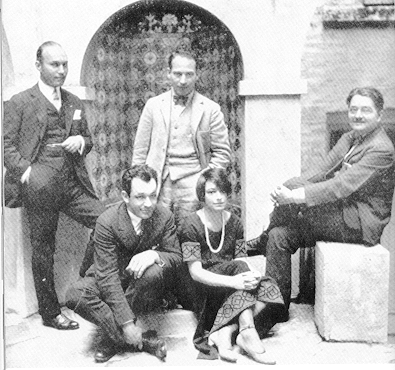This black and white picture of Dorothy Parker with the pencil in her mouth was pasted to my computer at work for many years. Its caption read: "Dorothy Parker, Master of the Bon Mot." It's true that Dorothy Parker is best known for her witty remarks, both in her personal life and in her book and theater reviews, but she was also a poet and literary writer. Her short story, "Big Blonde," is one of the best short stories I've ever read, and I feel she has been undervalued as a fiction writer. She hung out with mostly men which included fellow writer/critic, Robert Benchley, one of Dorothy's closest friends. They called themselves members of the "Algonquin Roundtable," a group of writers, critics and actors who got together for lunch every day at the Algonquin Hotel in New York City during the 1920's. Dorothy always held her own while she and these men tried to outdo each other by coming up with the most clever and witty wordplay. One of Dorothy's most famous on-the-spot witticisms occurred when someone challenged her to use "horticulture" in a sentence. She immediately replied: "You can lead a horticulture but you can't make her think." It was a play on the expression: "You can lead a horse to water but you can't make it drink." In this case, it was leading a whore to culture. Very clever! She was always up for a challenge and never let the men at the Roundtable intimidate her.
But there was one area of Dorothy's life where she didn't always show confidence and that was when dealing with the men she was in love with. A recurring theme of her poetry was her tortured feelings towards these men. Whether it is a new love or a love of many years, men always lead the women who love them into hours of agonizing reflection. Many of these heart-wrenching poems were recited by Jennifer Jason Leigh who brilliantly portrayed Dorothy Parker in the 1990's film "Mrs. Parker and the Vicious Circle." One of the best poems recited in the movie, entitled "Two Volume Novel," was connected to an affair she had with Charles MacArthur played by Matthew Broderick. It broke my heart when he broke her heart: "The sun's gone dim/and The moon's turned black/For I loved him/and He didn't love back." Her relationships often led her into depression and desperation, but she always found a way to turn things around and laugh about them. One of my favorite poems of hers is a famous one called "Resume": "Razors pain you/Rivers are damp/Acids stain you/And drugs cause cramps/Guns aren't lawful/Nooses give/Gas smells awful/You might as well live."
Another thing I love about Dorothy Parker is that she always had dogs in her life. I have a soft spot for dogs and had my own dog, Taffy, for 17 years. Towards the end of her life, Taffy had Alzheimer's. Yes, dogs can get that too. They run around in circles and cry out at night because they can't remember where they are. I used to sleep with earplugs to escape the howls. I kept her alive for two more years than I really should have because I couldn't bear to lose her. I don't deal with loss very well. Especially when I feel connected to something or someone. Of course you don't want to lose that. How many times in our lives do we really feel a strong connection? Still, I'm waiting to get a dog again. I know I will someday, but not now. Dorothy always had several dogs in her lives. Seems that when she lost one, she immediately replaced it with another, always moving on and looking ahead.
The first night I saw "Mrs. Parker and the Vicious Circle" on TV, I fell asleep because I was watching it in bed with my then-healthy dog. I woke up and saw Dorothy crying by herself. I didn't know what she was crying about, but I imagined she was crying about life and how sad it is. I grabbed my dog and thought about the dog I had growing up, my Cairn Terrier, and how it would be great to go back to being a child again. I always say that the best year of my life was when I was 9 years old. My dad was still alive, and he doted on me. I got good grades in school, had a lot of friends, and was "going out" with the most popular boy in our class. Nothing compares to the innocence of that time. That was all I really knew and that was all that mattered. But Dorothy wasn't crying about life. She was crying over her best friend, Mr. Benchley's, death. Of course she wasn't crying over something abstract. She had a real reason.
Dorothy wasn't the type to just cry about life. She was tough, and she taught us to lift up our heads and get over it. Kind of like that Elizabeth Taylor quote: "Pour yourself a drink, put on some lipstick, and pull yourself together." That could have been said by Dorothy herself, although Dorothy would have stuck something ironic at the end of it. Trying not to become paralyzed by hypersensitivity is something I struggle with, but when I read Dorothy's poems and think about her courage, I make a conscious effort to just not give a damn:
If I don't drive around the park, I'm pretty sure to make my mark.
If I'm in bed each night by ten, I may get back my looks again.
If I abstain from fun and such,
I'll probably amount to much.
But I shall stay the way I am,
Because I do not give a damn.
Thanks, Dorothy.




